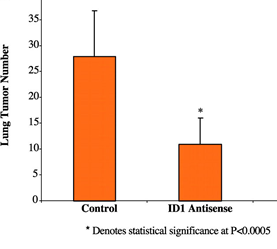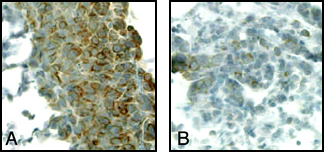APPLICATIONS OF TECHNOLOGY:

The mean number of lung metastases of tumor-bearing mice treated with a control gene compared to those treated with Id-1 antisense. Systemically targeting Id-1 expression significantly reduced the spread of 4T1 breast cancer cells.
Fig.1. Down regulation of Id-1 reduces metastatic spread.
- Prognostic marker for invasive and metastatic cancers
- Therapeutic target for the suppression of invasive and metastatic cancers
ADVANTAGES:
- Provides a highly accurate marker for invasive and metastatic cancers
- Identifies Id-1, a key transcriptional regulator, as a target for the development of cancer treatment that could be highly effective and more discriminate than those currently available
- Inhibition of Id-1 protein would beneficially affect multiple aspects of cancer progression
- Since Id-1 is scarce in most mature adult tissues, a majority of normal cells would not be affected by systemic therapy targeting this gene
ABSTRACT:
Researchers at Berkeley Lab and the California Pacific Medical Center Research Institute (CPMCRI) have discovered Id-1, a transcriptional factor that can be used as a target for suppressing aggressive and metastatic cancer cells. Id-1 can also serve as a reliable marker for cancer progression, invasion, and metastasis, allowing for accurate diagnoses and prognoses and therefore more appropriate therapies.
Based on previous collaborative research with Judith Campisi of Berkeley Lab, Pierre-Yves Desprez and colleagues at CPMCRI have shown in pre-clinical studies that human metastatic breast cancer cells become significantly less invasive in culture and less metastatic in vivo when the Id-1 protein is down-regulated by antisense RNA directed against the Id-1 gene. In a highly successful proof-of-concept experiment, these investigators targeted Id-1 expression systemically in tumor-bearing mice with a non-viral approach using liposomes, significantly reducing Id-1 levels and simultaneously the spread of breast cancer cells. These results point to the Id-1 gene as an extremely promising target for developing therapies to reduce breast cancer metastasis.
Fig. 2. Antisense inhibition of Id-1 levels in breast tumor cells

Immunochemistry analysis of Id-1 levels in 4T1 breast tumor cells harvested from the lungs of a control mouse (A) and an Id-1 antisense-treated mouse (B), Minimal staining in the breast tumor cells of the antisense-treated mice shows that Id-1 antisense was successful in reducing Id-1 levels.
Campisi and Desprez earlier determined that ectopic expression of Id-1 in murine mammary epithelial cells results in loss of differentiation and gain of invasive and proliferative abilities. Using immunohistochemistry, they found high levels of expression of the Id-1 protein in breast tumor biopsies from patients with aggressive cancer and low levels in ductal carcinomas, which are known to be noninvasive. In addition, ectopic expression of Id-1 in a noninvasive human breast cancer cell line rendered it invasive.
Furthermore, recent studies have shown that down regulation of Id-1 has an inhibitory effect on the metastatic progression of cancers of various tissue origins. This finding demonstrated that Id-1 plays important regulatory roles in cellular pathways critical to cancer metastasis and that a therapeutic intervention that targets Id-1 can inhibit the changes that allow aggressive cancers to invade and metastasize.
CPMCRI studies of Id-1 demonstrated that Id-1 can be down regulated, not only by RNA inhibition, but also by exogenous agents. If you are interested in learning more about an exogenous therapeutic compound developed by CPMCRI that can inhibit both cancer cell proliferation and invasiveness please contact Roni Fransis at FransiR@cpmcri.org
For more information see the California Pacific Medical Center Research Institute webpage and the links below to publications on the technology.
STATUS:
- U.S. Published Patent Application. Available for licensing or collaborative research.
FOR MORE INFORMATION:
See the California Pacific Medical Center Research Institute webpage describing this technology.
Related Article:
REFERENCE NUMBER: IB-1637
SEE THESE OTHER BERKELEY LAB TECHNOLOGIES IN THIS FIELD:
